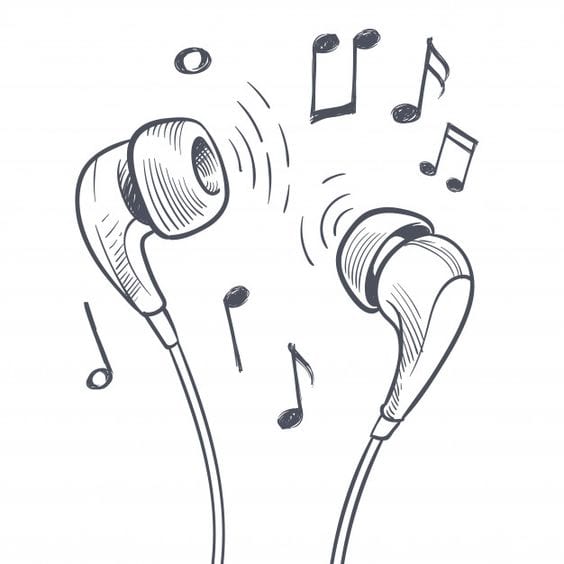Studying is not as easy as it should be. Sometimes, students struggle to prepare themselves for a recitation or major examination. However, you need to be motivated to ensure you will pass the tests.
If you just want to learn something new, music can be extremely helpful. Recent studies support the claim for the benefit of music to students. Stop forcing yourself to absorb information. Why not try to use music for your benefit?
Should You Put on Your Headphones While Studying?
Music could have good and bad effects on your ability to absorb information. However, it will vary from student to student. Not all music can help you concentrate. Not all music can distract your focus.
Every student is unique. The way you study might be different from how your friend does it. Some students are more able to study better and absorb information if they stay in a silent area. Even the softest and lightest sound can quickly distract these students. Are you one of them? If that is the case, music may seem unhelpful to your studying habits.
Luckily, some students can stay focused even when the dog barks or someone else in the house is watching TV. These students find themselves lost in the woods if the environment is too silent.
Whatever the case is, some music tends to disconnect a person from the real world. At the same time, it can help you stay alert and more focused on what you might be reading. That’s how you can absorb knowledge more interactively.
What Does the Science Say About Listening to Music While Studying?
Studies show that music has the magical power to help people stay relaxed. Also, it can be helpful for people when they’re reading or studying. Studies recommended classical music as good background music to use when you do something. Classical music can help a lot because it improves brain activity and one’s attentiveness.
While the notes fluctuate and the pattern, speed, and pitch change, the various portions of your brain will be enhanced. The good thing is that those processes do not affect your concentration. Music can also help improve the coordination between your brain, eye, and hands. For novice guitarists, playing acoustic music may help.
The Mozart Effect
There comes the so-called Mozart effect. It is the term that implied listening to music can help improve one’s intelligence. Many had rejected the idea, but the benefit of listening to music while studying is a good thing. This theory said listening to music, especially classical music, will make people smarter than they are. The Mozart effect was created in the early 1990s.
Dr. Gordon Shaw dubbed this theory. He was also the one who conducted a study about the ability of the human brain to do spatial reasoning. Together with Xiodan Leng, his student, they managed to create a model of the human brain and used some musical notes that represent the brain activity, showing the same results when scientists analyzed the notes of classical music.
This research led Gordon and his student to test classical music and its effect on the brain of college students. In 1993, they reported that a batch of college students underwent the test and appeared to have increased IQ levels. When reported, the media did their research and concluded that classical music makes the children smarter.
It led to the advent of those toys that involve classical music for kids. Pregnant women were also advised to let their unborn children listen to classical music and believe they’ll be smart when they grow up.
Unfortunately, scientists found the Mozart effect to be quite misleading. That is why some people are now calling it the “Mozart Myth” due to many reasons. First, college students underwent only the spatial intelligence test that obliged them to perform tasks like maze-solving or folding the paper.
The Mozart effect became insanely popular. After a decade, a group of scientists collected the results from nearly 40 studies held for the Mozart effect and got limited proof that music can help improve a person’s performance on some tasks. They also said they failed to find proof on the claim that classical music can boost IQ levels.
Nevertheless, some people truly came out doing better when they listen to music. The case will always vary from one person to another.
The Benefits of Listening to Music While Studying

Students of this modern age adopted the habit of wearing their headphones or earphones while going to libraries or study rooms. It doesn’t seem like a big deal, but does the music help them?
Here are some of the possible benefits that listening to music can offer:
Music Helps You Concentrate
Concentration and focus are indeed better when you stay uninterrupted. However, it is not always possible considering that almost every place can offer the silence you needed. Traffic and other things may suddenly distract you while studying. To concentrate better, you may prefer to listen to your favorite songs while wearing your earphones. It can be the best way to stay focus on your mind and eyes to what you might be reading.
Music Enhances Your Performance
Do you know that music can help improve brain activity? It is why music can be a good way to enhance your performance as a student. While you listen to a nice song, your brain becomes more able to absorb information from what you might be reading.
At times, your mind gets tired. It will need something that can keep it relaxed while you go on and continue the activity. If you’re one of the people who feel more comfortable when studying while listening to music, then you’re benefitting from it. Music improves your performance the more you listen to classical, instrumental, or any form of music.
Music Cures Pain and Discomfort
Music can also be used as a type of therapy. People who underwent surgery and patients with chronic diseases may benefit from music therapy. It’s among the most effective ways of reducing pain. It’s one of those things that show how beneficial and useful music is in the life of a person. Aside from providing some sort of relaxation, music can also magically cure pain.
Music Aids You to Concentrate More
Students who prepare for an exam feel like the absence of any sound in the environment doesn’t help them to concentrate. It is due to the pressure that their brain experiences at that moment.
There are some kinds of songs that can improve one’s ability to concentrate. Classical music is a good example. Even the science proved that kids and adults who might be listening to classical music don’t just experience relaxation but enjoy improved ability to stay attentive and focused. So, why not try to listen to your favorite hits while reading or doing your assignment on mathematics.
Music Enhances Your Attention and the Power of Your Memory
The best thing regarding music is you can listen to a song while you’re busy. Having the best background music can help sharpen your attentiveness. While you’re reviewing, you will also notice the way your mind is quickly distracted once something else comes into your mind.
With pleasing background music, it is easier to get rid of those distracting thoughts that may come unexpectedly. Besides, music can also improve your brainpower. Some studies backed the discoveries and conclusions that musicians developed improved mental skills due to musical training. It’s all because of that process that links the hand, eyes, and brain to one another while musicians are playing and reading notes.
Music Can Help Distract Your Brain from Distressing Thoughts
The most difficult part of learning and studying is to set yourself free from those disturbing thoughts. Some things can come to prevent you from understanding and internalizing what you have been reading.
Listening to music is a good solution to keep those thoughts at bay. Listening to instrumental songs can be so helpful to your case. This way, your mind stays free from anything that causes distraction, allowing you to concentrate.
The best gift that music gives to people could be its therapeutic effect on your soul. It does not matter whether you’re happy or sad because there’s always good hits that will match your mood. Everybody can relate to the need to hear good music.
Regardless of your age, preference, or race, there will be a song that turns to be your favorite. Listening to it no matter what you’re doing is no doubt a good idea.
The Downsides of Studying while Listening to Songs

Music can be distracting in some cases. Students listening to loud music can lead to problems associated with mood and reading comprehension. Soft music that is full of lyrics can also be distracting. Both things can lead you to absorb less information and failing to understand completely what you have read.
Whether it is an online module or a textbook, music can sometimes cause you to lose your mind, instead of doing the opposite. Thus, if you’re reading or learning something so important, it might be better to choose not to listen to the music of any kind during the activity.
If you want to listen to music, then pick a song that matches the activity. Picking the wrong type of song can easily distract you. For instance, you’re listening to a song that you usually play whenever you argued with your boyfriend or girlfriend. In that scenario, your feelings and mind are not on the same page. Since that song can intensely affect your emotion, sad thoughts will immediately come along that causes your mind to divert.
Outlined below are the most common drawbacks you may experience when you listen to music while studying:
- A student who listens to a song with lyrics while reading or writing something tends to become less effective. If he’s reading, he may end up absorbing less information.
- Agitated or loud music can hurt both mood and reading comprehension. It makes staying focused and attentive more difficult than usual.
- A student who uses music in memorizing things will have to listen to a song while taking the exam so that he can enjoy the advantages of the said study technique. If the environment does not have even simple background music, this student may struggle to remember what he memorized.
Inevitably, music can cause more harm than good in some scenarios. However, not every student will experience and suffer the disadvantages of listening to music. The effect of listening to songs on the study habits will still depend on the student and his or her learning style.
If he gets distracted even with just a soft noise, then he should avoid listening to music while studying. That way, he can effectively keep his focus on the activity. On the other hand, a student who performs better when there’s background music may continue listening while studying.
Best Songs for Studying
As said before, not all songs are suitable to be background music for studying. So, what is the best kind of music to play for this activity? The answer will always depend on the student. Many students will not be okay with the old-fashioned music of Mozart and Beethoven.
The golden rule of thumb is that any song that can be defined as something soothing will possibly help one while studying. This is true only for a student who feels fine with hearing nice music in the background while reading or solving a problem on algebra. If you want, you can even try downloading music that can help you while studying. It can be a very motivating movie soundtrack, spa music, nature sound, or anything that makes you feel uplifted without causing you to lose in the track. Whatever the song you play, it has to help you complete your assignments or projects. If your favorite song does the job, then there’s nothing wrong if you stick with it.



